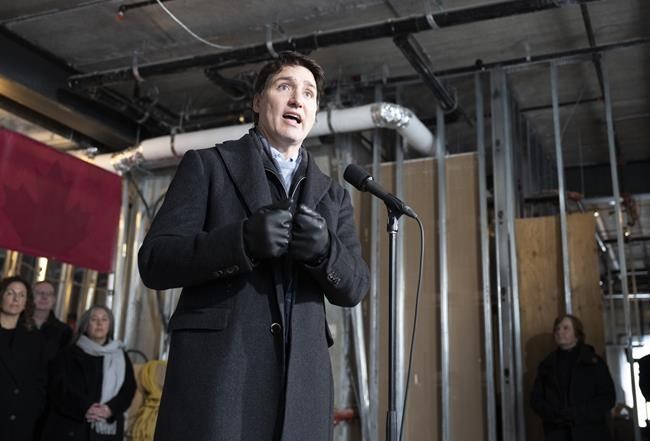VANCOUVER — The federal government is doubling the financing available for a British Columbia housing plan, which the prime minister called "transformative."
Justin Trudeau was in Vancouver on Tuesday to announce that Ottawa is adding $2 billion in financing to the province's new BC Builds initiative aimed at fast-tracking the construction of middle-income rental housing.
The prime minister called the plan "ambitious and fundamentally practical," saying the federal funding will help create a minimum of 8,000 to 10,000 more new homes.
That number will go up as more land is secured, Trudeau said, adding the new units won't be limited to one and two bedrooms.
"These will be units of all sizes, including up to three or four bedrooms, the kind of places where families can grow and they can call home," he said.
The money comes on top of $2 billion in provincial funding for low-cost financing for developers to fast-track affordable rental housing on land that's underused or owned by government, communities or non-profit organizations. B.C. is also committing $950 million to ensure units are available at below-market rates.
The province has so far identified 20 sites for possible construction.
The new homes will be available to families based on their income on a community-by-community basis, Trudeau said, calling it "truly targeted for the middle class."
"What you're doing here is transformative," the prime minister said, flanked by B.C. Premier David Eby and Vancouver Mayor Ken Sim, as they announced the funding on the rooftop of a condominium at the University of B.C. campus.
"And I am hoping that other provinces take careful note of the leadership that you've shown," he said, singling out Eby and his government.
"These are the things we need right across the country."
Trudeau likened B.C. to the "canary in the coal mine for the problems we're seeing across the country around housing affordability."
He said housing prices started rising in the province decades ago, and successive governments "ignored those warnings," while investors were buying up homes.
The BC Builds program demonstrates how to build homes for people to live in, "not just pad investor portfolios," the prime minister said.
Eby thanked Trudeau, saying the federal funding will help the province "change the direction of housing" through the model announced last week.
"What the prime minister has announced today, $2 billion in additional funding for the BC Builds program, will be transformational for thousands of families in British Columbia that are desperate for housing," he said.
"They can afford housing, they just need it to be available. This money will make it available for them."
Eby also announced the fourth site slated for development under the program, describing it as a "beautiful new co-op" in Vancouver's Yaletown neighbourhood with construction expected to start this summer on the 112-unit building.
A minimum of 20 per cent of those units must be rented out at 20 per cent below the market rate, says a joint news release from the B.C. and federal governments.
The BC Builds program promises to use lower government borrowing rates to offer financing and grants to bring down construction costs. The province says a team will help "streamline approvals" to have projects completed within 12 to 18 months.
It says renters will be "income tested" when they move in to one of the buildings with the aim of spending no more than 30 per cent of their income on rent.
The B.C. housing announcement came as provincial policymakers return to the legislature for the spring legislative session.
Later on Tuesday, Trudeau met with students at a secondary school in North Vancouver, saying it was an "incredible delight" to have been invited.
The prime minister said he loved his time as a teacher, and the experience has helped him as a leader, before taking questions.
One student asked Trudeau who he'd like to have a conversation with if given the opportunity, and the prime minister clarified whether they could be alive or dead.
"Dead," the student replied to laughs around the room.
Trudeau said he'd like to have a conversation with his father if he could.
"I'd love to see what my dad would think of the world as it is right now," he said.
Trudeau then visited with seniors at a community centre in the suburb of Richmond, where he asked those present whether they had signed up for the new federal dental plan, which starts in May.
He also said a large number of family doctors are poised to retire in B.C., while other health-care workers are overworked, causing them to “spiral out” of the health system.
The prime minister said his government is working to grow the number of family doctors, while trying to get more “results” out of the health-care system without pumping more money into it.
Trudeau ended his day as keynote speaker at the 99th Osler Dinner at a Richmond, B.C., hotel ballroom Tuesday evening.
Speaking to a room full of well-dressed medical professionals, Trudeau summarized recent deals struck with the B.C. government. He highlighted that B.C. was the first province to sign a tailored bilateral health agreement last October.
"B.C. will recruit more workers to make sure patients have improved access to team-based family health care," he said.
The room gave the prime minister a standing ovation after his speech and he made his way back to the table before B.C. Health Minister Adrian Dix, who was seated next to Trudeau, took the stage.
He said the partnership between the federal and provincial governments as was seen in the housing deal announced Tuesday morning is "essential."
"Housing is health care," Dix said. "We have to ensure that we're addressing the social determinants of health, which is fundamental to the partnership between our government and Prime Minister Trudeau's government."
This report by The Canadian Press was first published Feb. 20, 2024.
Brenna Owen, The Canadian Press




